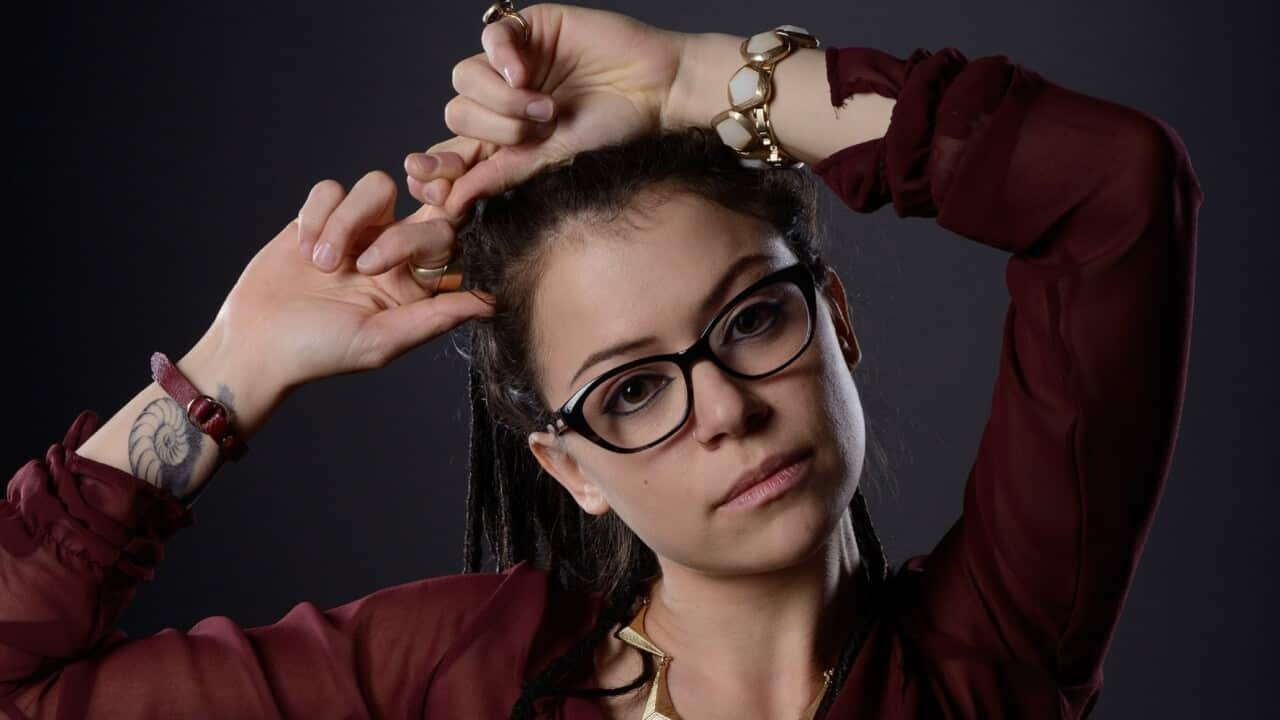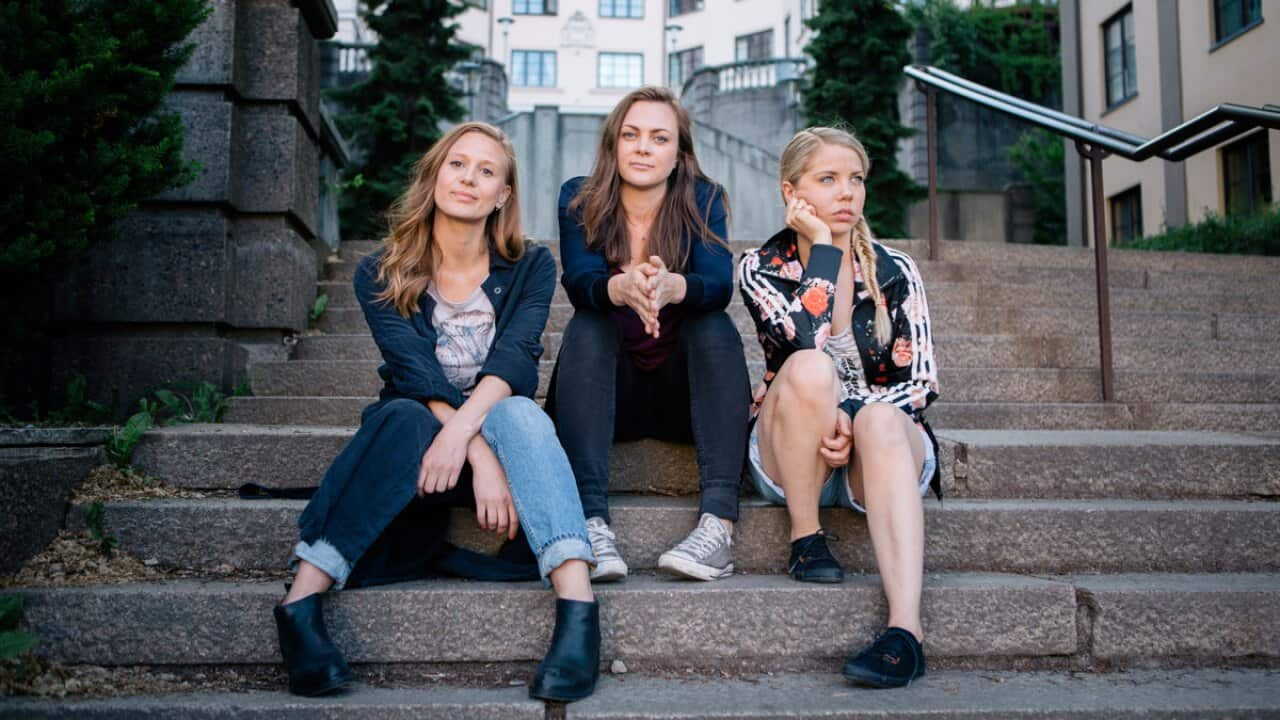Let’s start with the superficial. What was it? Was it the glasses?
...so like mine...
Was it the clothes - bold, colourful, unapologetic? Her patterned skirts, flowing cardigans, and enviable collection of loud shirts all somehow coalescing perfectly definitely added to the appeal, but that wasn’t it. Cosima Niehaus (one of the many genetic identicals played by Tatiana Maslany in Orphan Black) was more than that from the moment I first saw her on screen. She appears in the second episode of Orphan Black, in the closing seconds of yet another cliffhanger. Just as Sarah Manning is learning the truth about herself - she’s a clone, and one being hunted at that - Cosima steps out from behind a door, giving a casual wave and greeting. “Hi, I’m Cosima,” she says, genuine, relaxed, instantly approachable. She’s a familiar voice, previously only heard as a detached and anonymous voice on a mobile phone, instructing what to do calmly and even excited despite the constant peril. She felt familiar, despite the fact that she certainly wasn’t real, and nothing was even known about her yet. But when she walked into the room, there was something indescribable about her voice, the confidence with which she spoke. Ah yes, that’s it. Bold. Colourful. Unapologetic. And I’m not just talking about the skirts.
How do you describe the feeling of seeing yourself on screen for the first time? If you’ve experienced it, you’ll know what I’m talking about. It’s not unlike finding a soulmate, another connected with on such a deep level it’s piercing and immediate - all the parts that previously felt alien and lonely, that cast adrift instead of anchored slotting perfectly into place. On the surface I have little in common with Cosima, evolutionary developmental biologist and nerd who exhibits a particular penchant for drama, as these things often go.
Sure, there’s those thick black glasses that always seem to be falling down our noses, identical to mine when I first started watching Orphan Black, and the fact that we’re rarely around adults who are shorter than us. My only experience with biology is compulsory high school science class, which I happily left behind. On the more obvious level, I am not on the run from an international organisation, and nor am I a clone (although, that would be an interesting development). However, we share one important thing. It’s not a big thing, in fact we both wish that it wasn’t such a big thing. “My sexuality’s not the most interesting thing about me,” she says in season two, after another clone sneers at her about who she’s in a relationship with.
When I started watching Orphan Black as an 18 year old, how Cosima carried herself was what I wished to be. I grew up on movies and television, part of fervent fandoms on the internet and off, official and unofficial as long as I can remember. Pop culture was a life raft in childhood and through high school, providing solace whether it was through Glee or whatever show or movie I was obsessed with at the time, but never before had I felt this. Representation in all its forms is valuable, but there has to be some diversity. Queer women, the few and far between that existed on screen that I saw, didn’t look or act like Cosima. She was uninhibited, fully loving herself and expressing it freely. Her story is not a coming out story, not one of earth-shattering realisations defined by self-doubt and tragedy and conflict. She’s a brilliant scientist, a clone, she has more than a passing appreciation for weed, is deeply entangled in some seriously crossed wires, she’s countless other things. Yes, Cosima Niehaus truly knows who she is, and has the confidence and ability to declare it proudly to boot. I needed Cosima’s story at fourteen, fifteen, sixteen, and I certainly still did at eighteen, when she first appeared before my eyes. My own journey to that point had been forged over a long history of gradual revelations to friends that were tentative to everyone but myself - no earths were shattered for me. However, the only uncertainty came from the lack of identification, a true sense of belonging that resulted in only more alienation. I saw no one that looked like me, that felt queer like I did, so therefore maybe I wasn’t like them at all. This was one of the many things that Cosima Niehaus showed. She wasn’t just like me, possessing that uninhibitedness about her identity I so craved to have, but she also exhibited that there was no need to worry about fitting into a narrow idea of outward appearances.
I needed Cosima’s story at fourteen, fifteen, sixteen, and I certainly still did at eighteen, when she first appeared before my eyes. My own journey to that point had been forged over a long history of gradual revelations to friends that were tentative to everyone but myself - no earths were shattered for me. However, the only uncertainty came from the lack of identification, a true sense of belonging that resulted in only more alienation. I saw no one that looked like me, that felt queer like I did, so therefore maybe I wasn’t like them at all. This was one of the many things that Cosima Niehaus showed. She wasn’t just like me, possessing that uninhibitedness about her identity I so craved to have, but she also exhibited that there was no need to worry about fitting into a narrow idea of outward appearances.

Source: Supplied
But my story is far from unique, repeated in many an Orphan Black fan, Cosima resonating far and wide. Stories echo that at the , where a video surfaced of a young woman at the beginning of the show’s panel thanking Tatiana Maslany for her portrayal of Cosima, describing how watching the show with her parents helped repair her fractured relationship with her mother after coming out. “She sees Cosima, she’s seen that it’s ok and people are more than their sexuality,” she said. This is the thing about good, groundbreaking representation for the young, old, and in between, of telling stories of the girls not in conflict but in love. It heals and shines a beacon of hope - even if only for an hour a week. Hell, it even saves lives. It may be as small as a smile, a wave, and a ‘hi’, but it feels more like a lifeline. Grab on as tight as you can.
Orphan Black is fast-tracked within hours of the US broadcast to Sunday nights on SBS VICELAND at 8:30pm with episodes streaming from Sunday afternoons on SBS On Demand:





